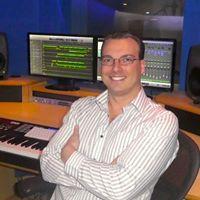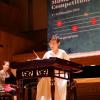Leaderboard
Popular Content
Showing content with the highest reputation on 06/09/2012 in all areas
-
I couldn't agree more. Far too much aesthetic emphasis is given to elevating the surface style of music - or indeed any other narrative artform; cinema, literature, even painting - above other deeper elements that are often more fundamental to making music music. Specifically, what a piece sounds like has only a limited role in defining its worldview and aesthetics, and often has the irritating side-effect of pigeon-holing it under some vague term as 'classical', 'romantic' and so forth. I've said this before but there are certain deep aspects of music that are common to almost all works even beyond the western classical tradition. Obviously we are writing in precisely this tradition and so can widen our aesthetic Venn diagram to include only things fundamental to it alone, but the point remains. What this means is that whilst they may sound very different, that squeaky modern piece you heard last week might actually have a lot in common with a Mozart quartet. It's of limited use to seperate the two in terms of compositional tecniques just because one is atonal and composed on a computer program and the other is based on decorating a functional harmonic pattern with a melody (if this is even how we should analyse Mozart). Perhaps finer study might reveal structural similarities, or that certain devices both composers use are intended to have the same effect or the same function, or even that the 'intensity curve', the narrative of the piece, is very similar. Another way to think of it is with a diverse group of dogs. They may all look very different - big, small, hairy, cute, aggressive - but they have a common ancestor and over 99% of their genes will be identical. So it is with music. Fundamentally, the elements that affect the listening experience are the same. What varies is the composer's choices regarding the deployment of these elements, for which there is great scope. What does this have to do with formal training? Firstly, it should be the responsibility of every composition pedagogue to emphasise this more fundamental aspect of musical creation and to regard surface style as being only of arbitrary interest. It is also as bad to only study the most modern avant-garde music as it is to ignore it completely. I remeber putting my hand up in a composition seminar entirely devoted to contemporary works and asking 'Is there anything we can learn from Haydn?' and getting a funny look and some dismissive answer from the lecturer. (Luckily my next teacher was more broad-minded). Teachers should ensire students see and understand as diverse a range of music as possible and most importantly introduce the idea that the vast majority of it is still relevant to the contemporary composer. Secondly, avoid labelling more than is neccessary as it will comporomise this view and encourage the student only to write in a 'contemporary' idiom (for which read a contemporary surface style). If I write a completely atonal piece using electro-accoustic overtone analysis but arranged the material in prototypical sonata form, is it a 'classical' or 'modernist' work? To ask the question 'why do all modern composers write is a modern style' is disingenuous: the answer is, they don't. What they do do is write using ideas and techniques borrowed from other musicians according to their own aesthetic choices, the end result of which eventually is labelled 'modern'. That should be your training.4 points
-
How much orchestration have you done before? Debussy piano music is hard to orchestrate well, partly because he did it so well himself and because it's all piano music and not just music for piano. There is so much that is so closely tied to keyboard technique that you will have to work out different ways of doing for an ensemble. I would strongly reccomend practicing on another piece less specific to a solo instrument if this is your first go at orchestrating for a large ensemble. Range considerations are pretty peripheral difficulties to such a project, if I'm being frank. Debussy usually transcribed for a standard orchestra, but you can write for any combination of instruments and transpose as neccessary. I've heard his music for harp, sax quartet, string quartet and string orchestra, all adapting the original with reasonable success. But simply copy-pasting what is on the piano staves into orchestral instruments will not create the same effects. With bass instruments your scoring choices for a particular note have to take into consideration the resonance of the piano and the effect of the sustaining pedal. A loud note in the low register of the piano, for instance, will have a sharp attack followed by a reverbaration and decay that can only be partially replicated by the contrabass, tuba or drum or a conbination of these. Conversely, a short note at the start of an arpeggio is often transcribed as a long held note with a decrescendo in the basses or celli with a pizz. at the start, to replicate the sustain pedal. These kinds of tecniques will only be revealed after careful study comparing his transcriptions with piano originals. Chamber ensembles will offer potentially an easier time in performance as there will be fewer problems co-ordinating complex rythms. However you'll have fewer colouristic resources to use and again possibly issues replicating piano-specific effects. And if you can get this performed or rehearsed at all it will teach you a lot. Sibelius and Finale do not offer feedback. As I said earlier, I would strongly reccomend not choosing this piece as a first project. Do something like Tchakovsky's Album for the Young or Kabelevsky pieces to get used to handling an ensemble transcription. Make versions of the same piece for different groups. The Debussy is an advanced project that will provide a rewarding challenge once you are more experienced.2 points
-
Hi Marzique Bordex, Thanks for your message. I find that when composing professionally you have to be careful not to let it kill the passion for writing. Producers and directors often know what they require from the music. Sometimes these limitations are frustrating but at others times very useful. They are usually commissioning the work so write what they want to hear; not what you want to do - unless they leave you with total create freedom. Deadlines are often very tight. I've worked on a lot of commercials. I remember in 2005 I was briefed to do the music for a commercial for an advertising agency. I was working as an in-house composer in Malaysia at the time. I was given just over an hour to compose, arrange and produce the final music mix. These are the times when you don't think; you just do! Yes, composing for a living is very competitive... more competitive than a lot of other industries. 12 years ago I read that only 10% of composers are able to make a living from writing music. These days it's even more competitive because millions of people have home studios and can get a decent setup for a good price. The capabilities of these studios sometimes exceed some studios worth $500k some 15-20 years ago. It's not all down to musical talent though - communication skills, enthusiasm and the ability to constantly move forward are a must too. Some of the most talented composers never get anywhere because they give up. Sometimes people with a mouth and a massive ego (but barely any talent) do really well. Everyone is different! If you have an original and distinct compositional voice and people like it - Jackpot!! This is based on my experiences. I'm still learning; that never stops. I could write sooooo much more but i guess i should close there. Hope it helps to answer your query. Kind regards, Jon1 point
-
1 point
-
I urge someone out there to compose an album entitled " The Four Emotions " if i don't compose it 1st. 1-Happy, 2-Anger, 3-Sad, & 4-Fear( These are in logical order of most to least desired). Like Vivaldi's four seasons for solo piano which is a formittable challenge due to temperment & constraint. Happy-Spring Anger-Summer Sad-Fall Fear-Winter But each song should be free of impurities from other emotions which will require dicipline oustanding any form of disarray which am often prone to. Each song should at least also be decent in quality as well. :shifty: The Formulas are: 1-Happy=somewhat fast tempo + Major Scale 2-Anger=Fast tempo + Minor Scale 3-Sad=Slow tempo + Minor scale 4-Fear=Fast or slow tempo + Chromatic Scale1 point
-
:horrified: Jon Brooks you seem an illustrious kompozer pertaining to your credits, this is indeed enlightening. What is it like to compose profesionally? I have never been comissioned so i am curious if one can make it as a kompozer in today's competative society. :D1 point
-
1 point
-
YouTube is an absolute godsend for finding new music, and by 'new' I also mean music from history that is new to me because it is obscure. Stuff copyright, I think it's nothing short of a public service that people are taking the time to upload their record collections so we can all hear pieces we wouldn't otherwise knew existed. A couple of suggestions that haven't already been mentioned: James MacMillan is a Scottish composer who works as a Catholic church musician. A lot of his output therefore is of choral music, both accompanied and unaccompanied, but he also writes symphonies, concerti and chamber music often as commissions from noted performers. Worth checking out are the percussion concerto 'Veni Emmanuel', the Symphony No.3 and the SInfonietta and Tryst as well as his motets. It's all quite approachable and often presents a modern twist on traditional British folk music. Thomas Ades is a bit of a controversial figure: as well as a composer he's also a fiendishly capable conductor and pianist and so sometimes gets derided for being flashy and all about style over substance. He notoriously wrote an opera, Powder Her Face, which depicts fellatio during its telling of various political scandels in the 1980s. However he is also capable of writing wonderfully tender moments in things such as the Piano Quintet, Tevot and piano music inspired by John Dowland. Again lots of big-name commissions. Kenneth Heskith (another contemporary Brit), Witold Lutoslawski (died 1990, Polish modernist), Kaia Saariaho (electro-accoustic music from a school known as Spectralism) and Sofia Gubadulina (pupil of Shostakovich) also worth checking out.1 point
-
Finding out about new composers is very difficult. I was hoping that this forum would help, but it seems people here think that composers like Barber or Copeland or even Schoenberg are still "modern"! Yikes..... Most of the greats of the last century are recently dead or very old. Part, Feldman, Reich, Glass, Carter, Ligeti, Penderecki, Boulez, Grisey, Stockhausen, Berio etc. The 50's and 60's was really the last, and probably one of the greatest, eras of "Classical" music. These days composers are quick to jump into film composing instead of producing works of art, so I think the game is over.1 point
-
Hi guyz, I saw this topic but just now I had time to actually withstand the 11 pages of nonsense. So let's get to it. I think the entire problem lies in that the answer to the thread's question is a question, "For what?" And also, of course, what the definition of "training" can be. Training can mean anything you do that relates to composition. Going to a concert is part of "training," for example, as it exposes you to the medium and gives you a chance to experience things first hand. Learning technical knowledge is also a type of training, as is learning to talk about your music and/or listening to others do it. For the question to be meaningful it's necessary to narrow down exactly what the person wants to do, before any kind of method can be looked into. For example, if someone wants to write symphonies in style of X composer, it's advisable then that the person seek out these compositions and study them (how is a different question altogether.) However it's only because there's already a set goal with defined parameters and stylistic guidelines that this is necessary. If the objective was something more abstract like "Write something that sounds good," as is more typical, it's possible that direct experimentation rather than specific technique study is much more valuable as a type of training. As this is a pedagogic question, it should be clear that different people require different methods and a single didactic approach can't hope to fit even a small minority of people, specially when it comes to something as vague as "teaching art." For this reason, then, let's look at the first post and formulate an answer that would fit the more exact parameters defined within the overall question: It's impossible to give a proper answer when it concerns potential, as it depends on too many factors that are unpredictable. Also, "formal training" is indistinguishable from simply knowing what you want to do and finding a method of accomplishing it, as I stated previously different objectives can be accomplished in different ways and it depends on the person what kind of approach works best. The importance of so-called "Formal" training here is the aspect of guidance, such as what I'm doing now, in terms of what methods the person may find useful in reaching their artistic objectives. It should be clear such guidance doesn't necessarily have to come from a teacher figure or an academic institution, it could be even a random suggestion on an internet forum (or reading history books, like he did when he cited Elgar's example.) As a closing thought, I think it goes without saying that none of this should concern itself with "quality" of whatever it is the person is trying to produce, but simply with the method by which they can reach a result they're happy with regardless of what it is.1 point




